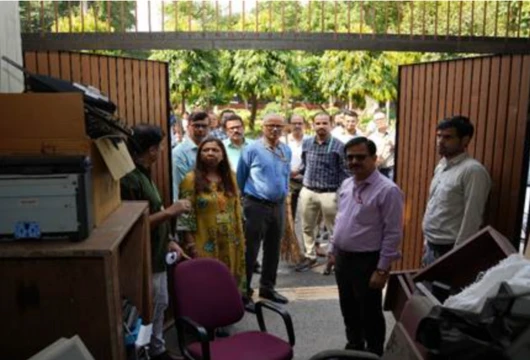In a move that reflects India’s accelerating commitment toward a sustainable and circular economy, the Department of Justice, Ministry of Law & Justice, has initiated a systematic identification and cataloguing of obsolete electronic equipment under the ongoing Special Campaign 5.0. The exercise, which began this week at the Jaisalmer House premises, marks a critical step toward institutionalizing responsible e-waste management within the government’s digital infrastructure.
The initiative focuses on the identification and safe disposal of unused or outdated devices such as computers, printers, scanners, photocopiers, and IT hardware. By doing so, the Ministry not only aims to free up physical space but also set an example for environmentally conscious public administration.
Department of Justice Champions Responsible E-Waste Management Under Special Campaign 5.0
E-waste is one of the fastest-growing waste streams worldwide, with India ranking among the top five producers. Recognizing this challenge, the Ministry’s campaign underscores the importance of sustainable digital governance — ensuring that electronic waste is managed in compliance with environmental regulations and disposed of through authorized channels such as the Government e-Marketplace (GeM) portal.
Senior officers of the Department conducted a comprehensive review to assess cleanliness and waste management standards within the premises. During their inspection, officials identified multiple categories of obsolete electronic materials, which will be systematically catalogued and processed for disposal. This process will follow strict e-waste disposal norms, ensuring transparency, safety, and sustainability.
A spokesperson from the Department highlighted that this campaign represents more than a routine clean-up — it’s a step toward institutional culture change, integrating sustainability into administrative functions and resource management.
Special Campaign 5.0 — From Cleanliness to Accountability
Launched as a national effort, Special Campaign 5.0 reflects the Government of India’s emphasis on operational efficiency, cleanliness, and transparency across departments. Its implementation phase, running from October 2 to October 31, 2025, aims to clear long-pending matters such as MPs’ references, PMO and inter-ministerial communications, public grievances, and Parliamentary assurances.
The addition of e-waste management to the campaign’s focus areas signals a shift toward climate-conscious governance. By integrating sustainability goals into administrative performance, the initiative bridges environmental responsibility with government efficiency.
According to Ministry sources, the Department of Justice has been proactive in embracing digital transformation, and this initiative complements its efforts to streamline operations and optimize IT infrastructure. Obsolete systems, once a logistical burden, are now being viewed as resources for responsible recycling, aligning with India’s broader vision for a green and resilient economy.
Aligning with India’s Green Goals
India’s approach to e-waste management has evolved significantly over the past decade, with policies emphasizing extended producer responsibility (EPR), recycling ecosystems, and public awareness. The Justice Ministry’s action under Special Campaign 5.0 reinforces this policy momentum by demonstrating on-ground implementation of sustainability practices within government offices themselves.
By promoting proper segregation, cataloguing, and disposal, the Ministry contributes to several national objectives:
- Reducing the carbon footprint of government operations.
- Encouraging responsible consumption and waste disposal.
- Setting benchmarks for other ministries and departments to follow suit.
- Enhancing public awareness of the importance of e-waste recycling in achieving the UN Sustainable Development Goals (SDGs), particularly SDG 12 — Responsible Consumption and Production.
The move also aligns with India’s Digital India Mission, which aims to modernize government systems while maintaining ecological balance.
From Obsolete to Opportunity
Electronic waste, when not properly managed, poses serious risks to human health and the environment. However, when processed responsibly, it becomes a valuable source of secondary raw materials such as precious metals, plastics, and glass.
The Department of Justice’s structured approach — identifying, cataloguing, and channeling obsolete assets through GeM — ensures these materials are recovered and reintroduced into the circular economy. This not only reduces landfill pressure but also encourages green entrepreneurship and supports India’s recycling industry.
Experts believe that initiatives like these have a multiplier effect: they reduce environmental impact, strengthen institutional accountability, and inspire both public and private entities to adopt sustainable IT asset management practices.
Institutionalizing Green Governance
The leadership shown by the Ministry of Law & Justice serves as a model for integrating sustainability into governance frameworks. Beyond waste management, the campaign’s broader goal is to build a culture of cleanliness, orderliness, and environmental stewardship in government operations.
Officers across departments are now being encouraged to assess their own digital waste inventories and adopt similar protocols. This inter-departmental ripple effect could accelerate the mainstreaming of e-waste management across India’s administrative landscape.
As part of Special Campaign 5.0’s ongoing review, the Ministry will continue to monitor outcomes, ensuring that all identified e-waste items are disposed of responsibly and that learnings are shared across other government departments.
A Model for the Future
With Special Campaign 5.0 gaining momentum, the Ministry’s e-waste initiative is poised to become a benchmark for sustainable governance in India. It sends a powerful message that sustainability begins at home — or in this case, within the very offices that govern the nation.
By embedding e-waste management into its operational ethos, the Department of Justice is not only enhancing internal efficiency but also reinforcing India’s global image as a champion of green governance and responsible digital transformation.
As government buildings turn cleaner, systems become more efficient, and obsolete electronics find new life through recycling, the campaign embodies a larger truth — sustainability is not an add-on; it’s an integral part of good governance.
For more in-depth analysis and inspiring climate news, click here.

